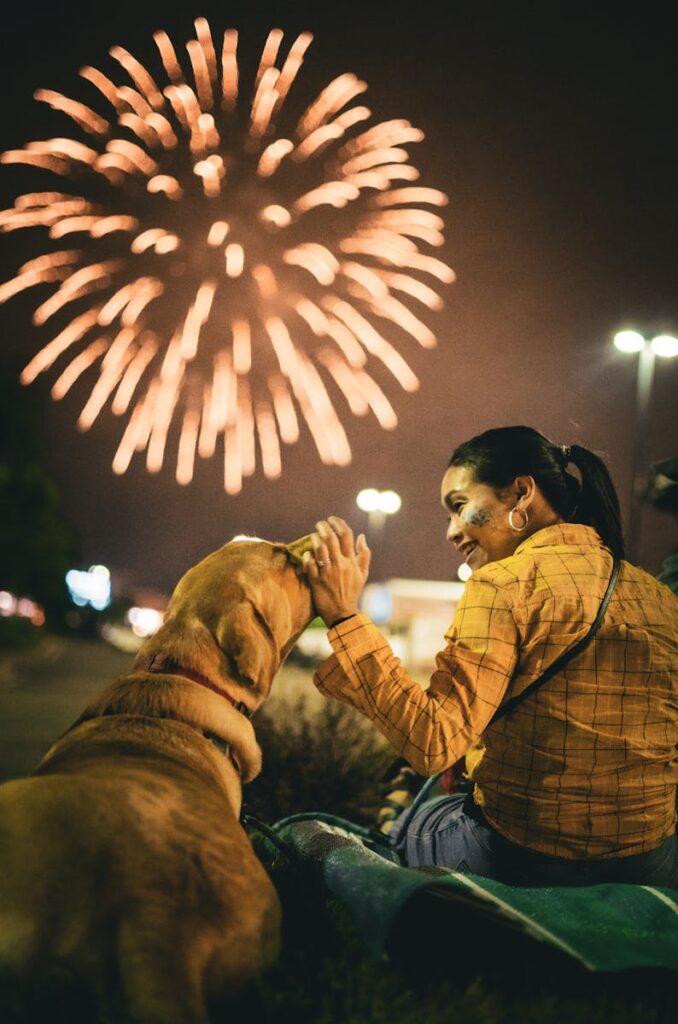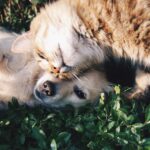Introduction: A Howling Problem
As the sky lights up with dazzling fireworks or rumbles with the ominous approach of a thunderstorm, many of us revel in the spectacle. However, for our furry friends, these events can be terrifying. Dogs have sensitive hearing and are easily startled by loud noises. This can lead to panic, anxiety, and even injuries. As a responsible pet owner, it’s crucial to take proactive steps to keep your canine companion safe and calm during these challenging times. In this guide, I’ll share valuable tips and strategies to help you navigate fireworks displays and thunderstorms with your furry friend.
Section 1: Understanding Canine Anxiety
Topic Sentence: Before diving into safety measures, let’s understand why dogs react the way they do to fireworks and thunderstorms.
Dogs have acute senses, including hearing and smell, far superior to ours. While fireworks and thunderstorms may seem exciting to us, they perceive them differently:
- Hearing Sensitivity: Dogs can hear frequencies up to four times greater than humans. Fireworks and thunderclaps, therefore, can be excruciatingly loud to them.
- Fear Response: Loud noises trigger the fight-or-flight response in dogs, leading to stress, anxiety, and panic.
- Association: Dogs may associate the sights and sounds of fireworks or thunderstorms with negative experiences, exacerbating their fear.
Did You Know?
- Dogs have up to 300 million olfactory receptors in their noses, compared to about 5-6 million in humans, making them highly sensitive to smell.
- Some dogs can detect thunderstorms approaching hours before they arrive due to changes in barometric pressure.
Section 2: Preparing for Fireworks and Thunderstorms
Topic Sentence: Preparation is key to helping your dog feel safe and secure during fireworks displays or thunderstorms.
Tips for Preparation:
- Create a Safe Space: Designate a quiet, comfortable area in your home where your dog can retreat to during fireworks or thunderstorms. This could be a cozy corner in a room with minimal windows and soundproofing.
- Desensitization Training: Gradually expose your dog to recorded fireworks or thunderstorm sounds at a low volume, rewarding calm behavior with treats and praise to help them become accustomed to the noise.
- Identification: Ensure your dog is wearing a collar with identification tags containing your current contact information, in case they escape due to fear.
- Consult a Veterinarian: If your dog has severe anxiety, consult your veterinarian about potential anti-anxiety medications or calming supplements to use during stressful events.
Did You Know?
- Dogs may exhibit symptoms of anxiety, such as pacing, drooling, panting, or hiding, during fireworks or thunderstorms.
- Some dogs may try to escape during fireworks or thunderstorms, leading to injuries or getting lost.
Section 3: Managing Your Dog During Fireworks or Thunderstorms
Topic Sentence: When the fireworks start or thunder rolls, it’s essential to remain calm and implement strategies to help your dog cope.
Strategies for Managing Your Dog:
- Stay Calm: Dogs can pick up on their owner’s emotions, so remain calm and composed to reassure your furry friend.
- Provide Distractions: Engage your dog in activities they enjoy, such as playing with their favorite toy or engaging in training exercises, to divert their attention from the noise outside.
- Use Calming Aids: Consider using products like thunder shirts, calming pheromone diffusers, or noise-canceling headphones designed for dogs to help reduce anxiety.
- Close Windows and Curtains: Minimize the sights and sounds of fireworks or thunder by closing windows and drawing curtains or blinds.
- Play Soothing Music: Soft, classical music or white noise can help drown out loud noises and create a calming atmosphere for your dog.
Did You Know?
- Dogs may seek out enclosed spaces, such as under beds or in closets, for comfort during fireworks or thunderstorms.
- Providing a favorite blanket or item with your scent can offer reassurance to your dog during stressful events.
Section 4: Aftercare and Recovery
Topic Sentence: Once the fireworks have faded or the storm has passed, it’s important to provide comfort and support to your dog as they recover from the ordeal.
Post-Event Care Tips:
- Offer Comfort: Reassure your dog with gentle pets, cuddles, and soothing words to help them relax after the stressful event.
- Monitor Behavior: Keep an eye on your dog for any signs of lingering anxiety or distress, such as pacing, panting, or loss of appetite, and consult your veterinarian if necessary.
- Resume Normal Routine: Gradually reintroduce your dog to their regular routine and activities to help them feel secure and confident again.
- Celebrate Small Victories: Praise and reward your dog for coping well during fireworks or thunderstorms, reinforcing positive behavior for future events.
Did You Know?
- Dogs can sense changes in atmospheric pressure and static electricity during thunderstorms, contributing to their anxiety.
- The recovery period for dogs after a stressful event like fireworks or thunderstorms may vary, with some dogs bouncing back quickly while others may need more time and support.
Conclusion: Keeping Your Canine Companion Safe and Sound
As fireworks light up the sky or thunder rumbles in the distance, remember that your furry friend relies on you for comfort and security. By understanding their fears, preparing in advance, and implementing effective management strategies, you can help alleviate their anxiety and ensure their safety during these challenging times. With patience, love, and a little extra care, you can enjoy the festivities while keeping your canine companion safe and sound by your side.
FAQs (Frequently Asked Questions)
Q: Can I give my dog human medication to calm them during fireworks or thunderstorms? A: It’s crucial to consult your veterinarian before giving your dog any medication, as some human medications can be toxic to dogs or have adverse effects.
Q: How can I help my dog overcome their fear of fireworks or thunderstorms in the long term? A: Gradual desensitization training, paired with positive reinforcement techniques, can help your dog become more comfortable with loud noises over time. Professional behavioral training may also be beneficial.
Q: My dog escaped during fireworks. What should I do? A: Immediately search your neighborhood and contact local animal shelters and veterinarians to report your lost dog. Ensure your dog’s microchip information is up to date and consider posting flyers in the area with your contact information.
Q: Are there any natural remedies I can use to help calm my dog during fireworks or thunderstorms? A: Some natural remedies, such as lavender oil or chamomile, may have calming effects on dogs. However, it’s essential to research and consult your veterinarian before using any natural remedies to ensure they are safe for your dog.
Q: How can I tell if my dog is experiencing severe anxiety during fireworks or thunderstorms? A: Signs of severe anxiety in dogs may include excessive drooling, trembling, destructive behavior, or attempting to escape. If you notice any of these signs, consult your veterinarian for guidance and support.




Pingback: Unraveling the Mystery: Why Do Dogs Shake or Tremble When Scared? – Dog Insights